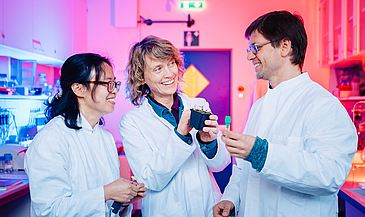Father, mother, child: That is the classic reproduction strategy in nature, both for animals and for plants. However, since 2017, other rules apply in the plant world – it was in that year that the working group of the molecular biologist Rita Groß-Hardt demonstrated that plants can have three parents: one mother and two fathers. The team at the University of Bremen caused a real stir in the field with their research findings.
Now, the working group has produced a further significant paper with Dr. Yanbo Mao as the first author. The renowned British scientific journal eLife has just published their new study, in which it has been determined that plants are able to smuggle genetic material past DNA checkpoints. “Plant breeders aim to combine the good traits of two different plants by crossing them. This is called hybridization,” explains Rita Groß-Hardt. “However, hybridization has its limits: If both plants are only distantly related, the hybridization does often not work. It is similar to the animal world: A stag and a horse can also not reproduce together.”
DNA Quality Is Continually Checked
But who decides if plant hybridization works? “There are various points in plants where it is checked if the father’s genes are related closely enough to those of the mother,” explains the molecular biologist. “These barriers are not only located in the egg cell. What is far more critical is that the genetic material must pass through the surrounding nutritive tissue. This tissue carries out quality checks and verifies the DNA with respect to the number of chromosomes and the degree of kinship. If the father’s DNA does not pass this check, the seed dies.”
That is the normal turn of events. In 2017, the researchers from Bremen showed that more than one sperm cell can merge with an egg cell in rare cases. “This is called polyspermy,” according to Groß-Hardt. If the sperm cells come from two different fathers, the offspring has three parents.
“Sneaking” into the Next Generation
“What our team – above all Yanbo Mao – has found out is that whilst the DNA of the first father must pass through the quality checks of the nutritive tissue, the genetic material of the second father can be smuggled past this checkpoint.” Thus, polyspermy offers the chance to sneak paternal genetic material into the next generation.
The recent research findings not only expand the current knowledge of plant reproduction significantly but they may also have an effect on agriculture in the medium-term. “Our planet is changing quicker than we would like. Conventional plant breeding can no longer keep up with the extensive changes caused by climate change,” explains the researcher. “We urgently need plants with an increased resistance against dryness and heat. If we are able to bypass certain hybridization barriers thanks to our research and therefore make use of the positive traits of more distant species, that would be a contribution to the agricultural challenges of the future.”
Patent Registration in Europe, USA, and China
The verification of the described processes on a molecular genetic level is complex work because new procedures needed to be created for it. Rita Groß-Hardt’s working group developed a molecular biology tool with which the seed that held the genetic material of two fathers took on a different seed color than the ‘normal’ seed. This allowed for clear identification of the seed. The “Three-Parent-Hybridization” procedure, which was developed at the University of Bremen, has been filed for a patent in Europe, USA, and China. The InnoWi patent management agency was involved in the patent protection and commercialization of the scientific results.
Since 2015, the European Research Council (ERC) has funded Rita Groß-Hardt’s research. The ERC awarded the scientist the renowned “ERC Consolidator Grant”, which is endowed with approximately two million euros. She is extremely grateful for this. “The funding allows us to break new ground with our research.”
Further Information:
Yanbo Mao, Alexander Gabel, Thomas Nakel, Prisca Viehöver, Thomas Baum, Dawit Girma Tekleyohans, Dieu Vo, Ivo Grosse, Rita Groß-Hardt: "Selective egg cell polyspermy bypasses the triploid block", eLIFE 2019, DOI: https://doi.org/10.7554/eLife.52976
Contact:
Prof. Dr. Rita Groß-Hardt
Faculty of Biology / Chemistry
University of Bremen
Phone: +49 (0)421 218-50203
Email: gross-hardtprotect me ?!uni-bremenprotect me ?!.de

